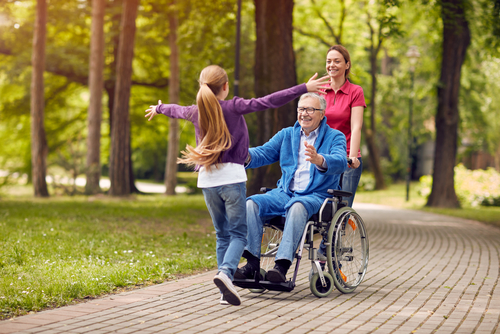Even with rising vaccinations and plummeting infections, strict COVID nursing home visitation rules remain in place
With the arrival of COVID vaccines, the question of when family members can visit their loved ones in nursing homes is being asked with increasing frequency. Considering the falling number of new COVID cases in nursing homes and the rising number of residents receiving vaccinations, families who have been separated from their loved ones in long-term care facilities since last spring’s lockdown, sensing a corner has been turned in the coronavirus pandemic, are hoping visitation can soon resume. But according to an article in the LA Times, reopening visitation in nursing homes is not simply a matter of throwing open the doors, but a complex issue of science and ethics that leave regulators wary to begin loosening regulations.
With the rampant spread of COVID-19 that began last spring in long-term care facilities across the nation, lockdowns—intended to shut residents in and visitors out—swiftly followed. The coronavirus pandemic presented a crisis unlike any other encountered by the nursing home industry. As the death toll began to climb toward the more than 163,000 residents and employees that would be lost over the next several months, isolation became the primary mitigation measure. In the ensuing weeks, and then months, spent waiting for the development of a vaccine, lockdowns remained in place and another noticeable toll began taking its quiet place in the wake of virus deaths: the rise of depression.
Particularly among residents with dementia, isolation—from loved one’s visits, from activities, and from other means of mental and social stimulation—has resulted in an uptick in depression cases, which often go hand-in-hand with an increase in weight loss, frailty, falls, infections, and even death among nursing home residents. With this in mind, as more and more nursing home residents become fully vaccinated, family members and advocates are pressing for a reopening of facilities to visitors, and regulators grapple with the best way to reintroduce visitation in times where things remain uncertain, including whether or not vaccinated persons can still transmit the virus to others.
According to the LA Times article, a common stumbling block includes the number of residents and workers who are refusing vaccinations. The article cited a recent report by the U.S. Centers for Disease Control and Prevention (CDC) that indicates 78% of residents offered a vaccine have accepted it, while only 38% of staff members did the same. The question remains on how homes will handle reintroducing visitors into a facility where certain people might remain vulnerable to infection.
While decisions at the federal level about changes to visitation rules have yet to come down, state-by-state regulations, as outlined by the American Association of Retired Persons (AARP), remain in effect. According to the site, the following are the kinds of visits permitted in Pennsylvania and New Jersey:
- New Jersey—Those facilities that meet requirements and wish to open doors to visitors may have indoor visitation for compassionate care visits only. Masks must be worn and social distancing measures must be followed. Only two persons per resident may visit. Outdoor visitation (weather permitting) may also be scheduled. For more information, view the latest New Jersey Department of Health guidance.
- Pennsylvania—Compassionate care visits are permitted for residents with terminal diagnoses or those in end-of-life circumstances. At this time no other visits are permitted, although a phased reopening plan has been adopted to ultimately allow for the return of visitors to virus-free facilities. For more information read the latest Pennsylvania Department of Health guidance.
Fighting for Your Loved One in the Midst of Crisis
The coronavirus pandemic has had a major impact on the daily lives of residents in Pennsylvania and New Jersey nursing homes. Securing the well-being and safety of your loved one residing in a Philadelphia/PA or NJ nursing home is a top priority. Should the quality of care in your family member’s Pennsylvania or New Jersey nursing home during COVID-19 cause you concern, or if you suspect neglect, abuse, or fraud has occurred at the Pennsylvania, Philadelphia, or New Jersey nursing home where your loved one lives, please contact nursing home abuse attorney Brian P. Murphy to discover your legal rights and options.







